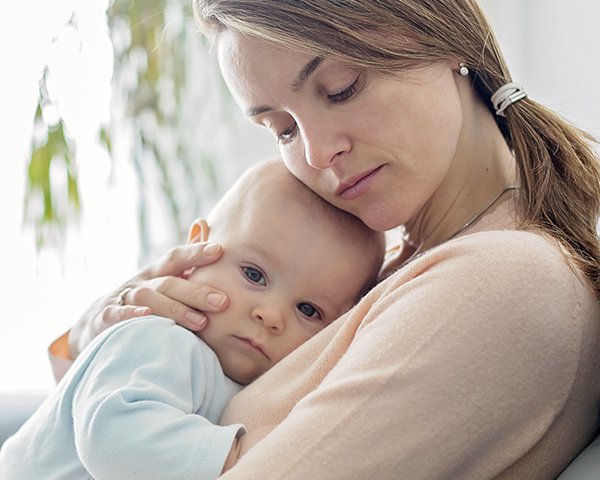
The CDC estimates 1 in 9 women experience postpartum depression. This can be easy to confuse with the more-common “baby blues,” which refers to worry, mood swings, tearfulness, and difficulty sleeping caused by extreme hormonal changes in your body. Unlike “baby blues,” which usually resolves itself within two weeks of delivery, postpartum depression has more intense, long-lasting symptoms.
Postpartum depression shares many of the typical symptoms of depression, listed below:
- Lasting sad, anxious or empty moods
- Feeling hopeless, pessimistic, guilty, worthless, helpless, irritable or restless
- Loss of energy or interest in hobbies and activities
- Problems concentrating, recalling details, and making decisions
- Difficulty falling asleep or sleeping too much.
- Overeating or loss of appetite
- Thoughts or attempts of suicide
- Aches or pains that don’t improve from treatment
There are a few symptoms, however, that set postpartum depression apart from depression, including:
- Crying more often than usual
- Feeling guilty, angry, numb, or disconnected from your baby
- Withdrawing from loved ones
- Worrying that you will hurt your baby
- Doubting your ability to care for your baby
Postpartum depression can happen to anyone, but there are some factors that place women at a higher risk, such as low social support, a history of depression or anxiety, pregnancy or birth complications, having multiples (like twins or triplets), preterm labor and delivery, or experiencing difficulties breastfeeding.
Since postpartum depression is so common, there are many treatment options available. Your doctor may recommend an antidepressant or seeing a mental health professional.
LiveHealthOnline.com is a great way to access therapy from home, especially if the idea of finding a therapist and going to appointments is overwhelming. New parent groups can also be great resources, offering needed support, education, and social connection.
Remember, the best thing you can do for the health and happiness of your baby is to dedicate the time, energy, and resources to getting the help you need.
Comments and opinions are from Lindsay Henderson, PsyD, alone. She is a psychologist who treats patients using LiveHealth Online Psychology.
Recommended Posts




